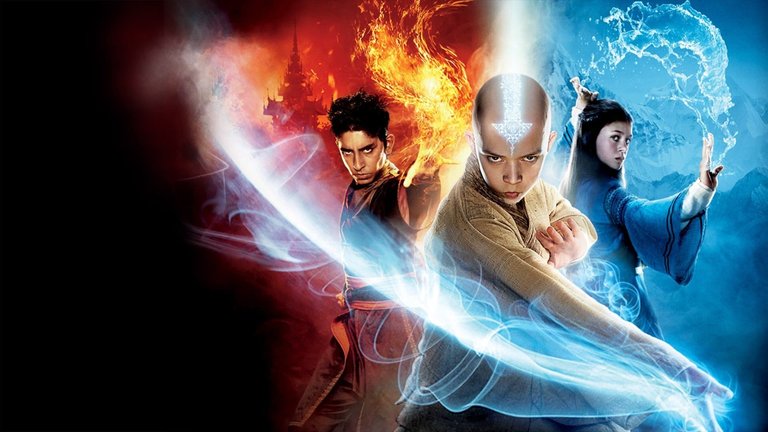Film Review: The Last Airbender (2010)

By 2010, M. Night Shyamalan, once hailed as the toast of Hollywood following smashing success of The Sixth Sense, became the punchline of the industry with a series of films that were collectively perceived as progressively worse. Despite his reluctance to yield to criticism, Shyamalan decided to deviate from his usual formula and adapt a popular source material: the animated television series Avatar: The Last Airbender. Unfortunately, the resulting film, The Last Airbender, became one of the most infamous flops of the previous decade and marked a new low for Shyamalan's career.
Set in a fantastical world influenced by various Asian mythologies, The Last Airbender introduces audiences to a realm where different tribes possess the ability to manipulate one of four elements: fire, water, earth, and air. The Fire Nation seeks to dominate the other nations, igniting war across the land. Central to the plot are Katara (played by Nicole Peltz) and her brother Sokka (played by Jackson Rathbone), members of the Southern Water Tribe who stumble upon Aang (played by Noah Ringer), a young boy from the Air Nomads who has been in hibernation for a century. Unbeknownst to him, Aang is the last surviving Airbender and potentially the Avatar—a figure capable of bending all four elements. This revelation makes him a target for General Iroh (played by Shaun Toub) and Prince Zuko (played by Dev Patel) of the Fire Nation, who are determined to capture him.
The ambition behind The Last Airbender was considerable; produced by Paramount Pictures with a substantial budget, it was initially conceived as the first part of a trilogy that would adapt each season of the original series. Although it achieved decent box office returns—grossing approximately $320 million against its $150 million budget—critical reception was overwhelmingly negative. Fans of the original series were particularly vocal in their disdain for Shyamalan's interpretation, leading to widespread derision and even multiple Razzies. In subsequent years, many involved distanced themselves from the project, highlighting its failure as a significant blemish on their careers.
Surprisingly, those who approach the film with an open mind might find it has some redeeming qualities. Shyamalan's direction seems to handle the large budget well, with decent CGI effects, interesting production design, and excellent cinematography by Andrew Lesnie that utilizes bright colors to bring the fictional world to life. In comparison to many similar fantasy blockbusters, the film's world appears vibrant and engaging.
However, Shyamalan made a critical error in his adaptation: he imposed an arbitrary runtime limit of 90 minutes on a story that deserved far more time for development. Attempting to condense the intricate narrative of an entire season into such a brief format resulted in significant shortcomings. Numerous characters were either omitted or inadequately developed, leading to glaring plot holes and unanswered questions. The film concludes with an unsatisfying cliffhanger that leaves viewers feeling frustrated rather than intrigued.
Compounding these issues was the film's reception within the context of contemporary political discourse. Critics seized upon what they perceived as “whitewashing,” arguing that casting white actors like Rathbone and Peltz in roles inspired by East Asian cultures was problematic. Despite Shyamalan being of South Asian descent and efforts made to include diverse casting choices within certain roles, these nuances were largely overlooked amidst the backlash. It is likely that more popular or respected directors such as Steven Spielberg or James Cameron would have gotten away with similar casting decisions.
While The Last Airbender is far from being classified as a good film, it remains watchable under certain conditions. The viewer's experience may heavily depend on their familiarity with the original animated series; for ardent fans, Shyamalan’s adaptation is likely perceived as sacrilegious. Conversely, those unacquainted with the source material might find value in its visual spectacle or ambition. If this film serves as an entry point for newcomers to explore Avatar: The Last Airbender, it may have fulfilled at least one aspect of its intended purpose.
RATING: 4/10 (+)
Blog in Croatian https://draxblog.com
Blog in English https://draxreview.wordpress.com/
InLeo blog https://inleo.io/@drax.leo
Hiveonboard: https://hiveonboard.com?ref=drax
Rising Star game: https://www.risingstargame.com?referrer=drax
1Inch: https://1inch.exchange/#/r/0x83823d8CCB74F828148258BB4457642124b1328e
BTC donations: 1EWxiMiP6iiG9rger3NuUSd6HByaxQWafG
ETH donations: 0xB305F144323b99e6f8b1d66f5D7DE78B498C32A7
BCH donations: qpvxw0jax79lhmvlgcldkzpqanf03r9cjv8y6gtmk9
Posted Using InLeo Alpha